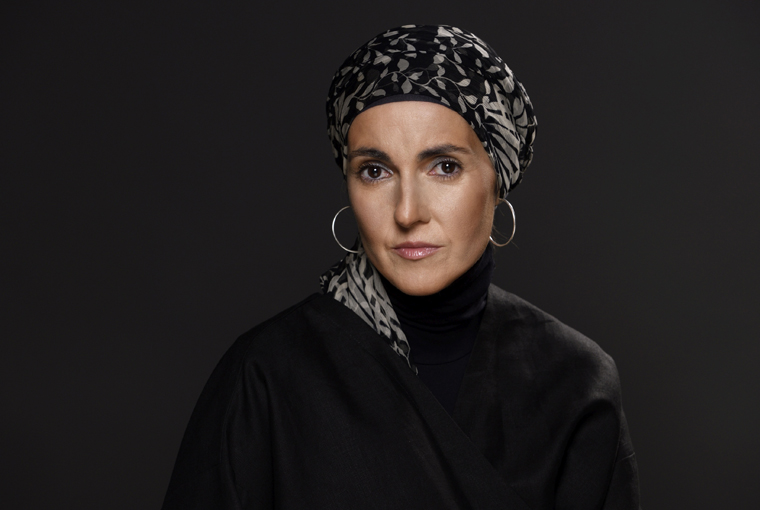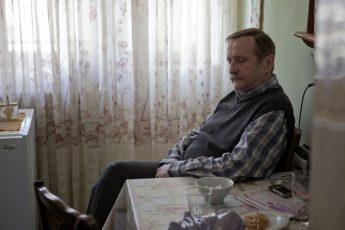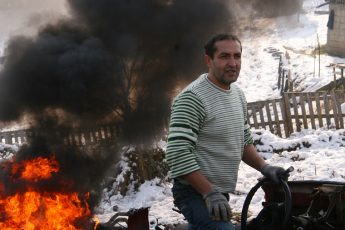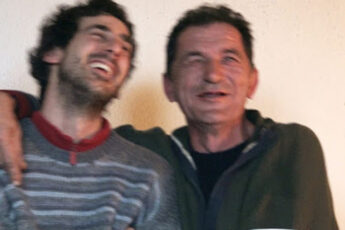
We met Bosnian filmmaker Aida Begić during the 63rd Thessaloniki Film Festival (November 3-13), where she presented her latest feature “A Ballad”. Begić discusses the decision to deviate from her previous themes and aesthetics, the perception of the Balkans abroad and domestically, and how her film was received at home.
A Ballad makes a significant departure from your previous films in terms of style and theme. What was your motivation for making this film at this moment in your career?
During the siege of Sarajevo I was very young, I was studying film directing and I was only 17 when I entered the film academy. If it wasn’t for the war, I would probably have made a film like A Ballad right after graduation. But since I had that terrible experience, I had to deal with more mature subjects. After three films dealing with war and the past, I felt that I needed to get this burden off my chest. So I made A Ballad in order to free myself from some things and leave behind the theme of war and its consequences. I also wanted to explore filmic language in a way that I have never been able to do in my previous films. I’m sure though that we will go back to themes connected to this painful past. Perhaps, in the distant future, will we be able to find the most appropriate way to address the war and our past.
In a critical text, Yugoslav writer Danilo Kiš discusses the dichotomy between Homo poeticus and Homo politicus, stating how “Homo politicus is for us Yugoslavs” and noting how “Westerners expect Eastern European authors to concern themselves with politics, not love.” Do you think this statement also applies to you as a Bosnian, post-Yugoslav filmmaker?
It seems that we have always had such turbulent political circumstances that no one is really interested in other aspects of our lives. On the other hand, it is not easy to overcome certain expectations for the cinema of third-world countries. Cinema is increasingly becoming an area of activism rather than art. However, I noticed that younger generations do not want to talk about politics at all. They are so fed up with the grey every-day reality they are experiencing that they acquire a desire for different topics, such as love stories. This is perhaps some form of escapism. But on the other hand, I think that it also represents our need to jump into a brighter future, because the political situation in Bosnia is always stressful. Also, many films are artificially made to look like there is permanent conflict in Bosnian society, but, essentially, people are not in conflict. So I’m sure that these new generations will move forward and explore new subjects and themes. As for my generation, we are marked by war.
Who are your cinematic, artistic, or literary interlocutors?
I watch and read various things, of course, but for A Ballad, I’ve spent some time discovering Bosnian oral poetry, and I watched lots of Nouvelle Vague films, especially the films of Jean-Luc Godard, as well as 1990s American cinema.
In the post-screening Q&A at Thessaloniki Film Festival, you stated how you’ve been missing the magic in cinema. Perhaps you were referring to the “festival film” syndrome and much of art house cinema from Eastern Europe, which reproduces a typical picture of Balkan society and people through harsh social dramas. In which ways is A Ballad an attempt at recreating magic in cinema?
I was searching for poetry within a brutal reality, a kind of beauty that is found in poverty and other mysterious aspects that may exist in the lives of my characters. People in Bosnia are tired of watching a realistic reenactment of their everyday lives on screen. They miss other angles, artistic and otherwise, and I think that is what art should offer. So I felt some kind of liberation in making this film, because it is hard to be a young filmmaker while dealing with topics that you are not even able to properly digest. In fact, I felt that I never did what I really wanted to do because I never had a story that I could play with.
Furthermore, A Ballad is a Bosnian production. We were planning to search for co-production partners but that was not really possible because we shot the film during the COVID pandemic. So I thought that not having co-producers could be an opportunity, something that could give me leverage to do whatever I wanted. I’ve worked with the same crew since my graduation. So I think that we all reached a level where we could experiment together in this film. And I’m really happy for all of us. I think we needed this film both as human beings and as artists.
As you mentioned, this was a low-budget production, and yet the absence of funding led you and your creative team to adopt a freer, almost experimental, approach to the film’s aesthetics. A Ballad breaks with cinematic conventions of typical art house films from the region that circulate at international film festivals, and continually reinvents its own film language to tell the story of Meri, a 30-year-old woman who leaves her partner and daughter to take charge of her life. At times, the camerawork calls to mind the freestyle low-budget video aesthetics of the Danish Dogma movement. Did you have any particular films or filmmakers in mind when working on A Ballad?
My director of photography Erol Zubčević and I took as reference movies such as Thomas Vinterberg’s Celebration, as well as Harmony Korine’s Julian Donkey-Boy. We also admired the structure and aesthetic approach of Oliver Stone’s Natural Born Killers. Now, for most filmmakers, I think that it is not so hard to secure funding for their first film. If it is successful, then it is fairly easy to finance the second film as well. But for the third film and so on, it gets harder because most of the funding in our region is geared towards filmmakers making their first or second features. Securing funding for A Ballad was difficult because it is my fourth film and because it doesn’t have an attractive pitch, in the sense that it is layered and does not follow a conventional narrative. So we succeeded in getting some funding from Bosnia and then we decided to exclusively work with this small budget (less than 250 000 Euros). This kind of budget forces you to come up with things and to gear the language and your approach to the available means. Sometimes that is a problem, but at times it can also force you to be creative, to imagine and invent things.
The film is playful when it comes to colors, and certain scenes appear saturated in bright pink, red or dark blue. The film’s visuals make the audience constantly aware of the filmmaking process, something that is linked to the ending, which takes a step back to “reveal” that it was “just a film”. Why was it important for you to never let the audience forget that they are watching a film?
The ending takes us back to the film set, so I wanted to gradually bring the audience back to that point. You are aware from the very beginning of the existence of a film set, there are even auditions for a film. I was playing with different layers of “reality”.
On more than one occasion, the characters appear as spectators looking at images of their own lives. Specifically, Meri’s ex-husband deals with their breakup as a lone viewer who looks back at his own memories, which unravel like a home movie before his eyes. Beyond reminding the audience that they are watching a film, is this to be taken as a broader comment on contemporary spectatorial habits?
There are so many beautiful tools immanent to the language of cinema that I did not really employ in my previous work, e.g. ways of bringing the audience into your character’s mind through the use of images. I wanted to use those tools and have fun with nonlinear storytelling. I was aware that some spectators would be surprised by those choices.
The Indian writer and activist Arundhati Roy pointed out how “a return to normality” was no longer possible after the rupture caused by the COVID pandemic. Would you say that your film is a step towards developing a new cinematic ethics of intimacy and solidarity in post-pandemic times? Could you perhaps also tell us how you worked with the actors?
I worked in the same way I usually work. I first develop a version of the script, like an idea, and then I search for actors and locations. Once I have found the actors, I make another draft with the cast in mind. Once I find some locations, I make another draft. After rehearsing on location, I re-write the script and I may adjust some scenes even during the shooting. So my script is never truly finalized. The filming process itself was very stressful since we were shooting in November 2020, which was the peak of the COVID pandemic in Bosnia. But I did not change the way I tend to work with actors. We had rehearsals and we visited the chosen locations together to prepare and experiment. We just needed to wear masks and be more careful. But those times are behind us and I think that people continue to live normally, to hug and laugh. It is in human nature to forget traumatic experiences and go back to their old habits.
In A Ballad, there is an interesting use of gender dynamics. Male characters are emphatically child-like (take the rap scene and Meri’s brother), and female characters dream of either being on stage or performing in front of an audience. This also reminds us of Chekhov’s The Seagull and Nina, a character that, wishing to escape the limited horizons of her birthplace, ultimately ends up being full of regret. In addition, your film was inspired and makes reference to the 17th century Bosnian epic folk ballad Hasanaginica, which tells the story of how Hasan Aga’s wife ended up grieving for her kids. Why was it important for you to use characters that project their dreams and desires within the context of talent shows and theater?
When I am developing my stories, I always go to many different small places around Bosnia because I like to meet real people. I go to villages and the suburbs, and I like to work with non-actors. Many people that I’ve encountered that way had talents that they’ve never had the chance to develop. They enjoyed presenting their abilities to us through dance, acting or singing. I learned a lot from giving them classical monologues and seeing their understanding of the lines. The demystification of “high art”, when performed by people who have no knowledge about classical drama, can bring a special magic to it. I met a lot of women during the long process of developing A Ballad and I realized that most of the time women in Bosnia embody many contrasts, different colors and behaviors. Most of the time, these women are strong fighters, but at the same time they obey patriarchal patterns and often become victims. So for me the idea of a woman is complex and includes many elements that coexist in one person. Hasanaginica, the folk ballad, pictured only one aspect of a woman, the one associated with victimhood. I like this ballad a lot. I believe it is more about love and poetry than what is implied by its screen and theater adaptations that we can find in the Balkans, which are all made by men. So, I tried to imagine what a modern Hasanaginica would look like today, in the suburbs of Sarajevo. My character, Meri, is not a heroine and is not able to completely break the pattern of victimhood, but I tried to also shed light on other aspects of her character. She is trying to understand who she is, to define her freedom and discover her own talent. In this respect, I believe that I have created a new and more complex Hasanaginica character.
Your film has already been labelled by the media as a feminist emancipation story. Yet, Meri-the-character fails to truly escape the ties of a patriarchal society, but the sudden ending allows a different kind of escape, as Meri-the-actress appears capable of challenging the filming process itself. One could see in the film’s ending a kind of liberation that transcends the category of a happy ending where for instance Meri takes charge of her life and escapes with her daughter. Instead, Meri overturns the most fundamental rules of the “game” (here, the actress leaves the set and comments on the problems of the script while being questioned by the little girl). Is this a comment on how cinema should approach women’s struggles and emancipation?
It is funny how activism took over the arts and how cinema is pretentiously trying not to be pretentious. This ending is in a way a self-ironic treatment of emancipation, freedom, film endings etc. I did not know how to end my story and then I discovered that every ending is wrong. If she dies, it would be too depressing, hopeless and a closed ending. If she wins, it would be a Hollywood-like victory for the main character. Open endings are already an old-fashioned thing. So, I felt that all endings would somehow be wrong and I just tried to insert those personal dilemmas in the last dialogue.
How was the film received in Bosnia?
I was curious about the local and regional audiences. It was nice that “ordinary” people reacted interestingly to the film, people who are not involved in the film industry and do not have a habit of going to the cinema. I purposefully invited them to the screening of my film to see their reactions. They liked it, they felt the film was really about them and represented who they really are. It is really interesting to receive this sort of feedback, having people recognizing themselves in this different kind of structure and approach. So I think that I did not stray from the authenticity and mentality of the region. Also, the younger generation in Bosnia liked it. For me this was the biggest achievement, as I was hoping that they would at least find it interesting. Students never like what older colleagues do and that is normal, because they always want to make better films and I truly hope that they will make them. I somehow dedicated the film to the women of Bosnia. But somewhere deep down, I also dedicated it to the younger generation, as a sort of provocation. Due to the language I used, I dared to send them a kind of message and invited them to engage with this sort of approach.
Are we allowed to have films with happy endings in the Balkans? If so, what would they look like?
We need some happy endings in our films, or, at least, in TV series. Life in the Balkans is not that much more tragic than in any other part of the world. It is more about how we treat our own story in film. We are used to looking at ourselves as losers and savages. It does not have much to do with any factual pervasiveness of difficulties in our region, it is more a narrative that we are used to watching, or, maybe, a narrative that is expected of us.
Thank you for the interview.




Leave a Comment